
Рейтинг Свободы прессы 2013
.pdf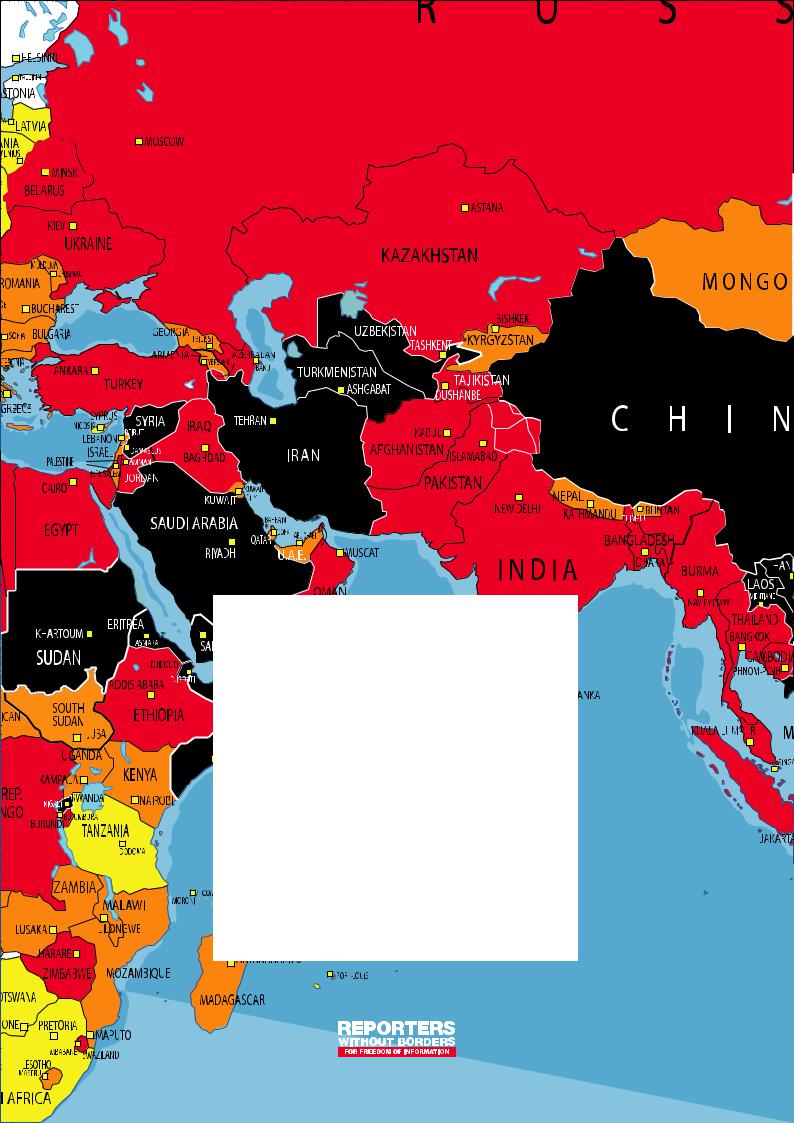
world press
freedom index
2013

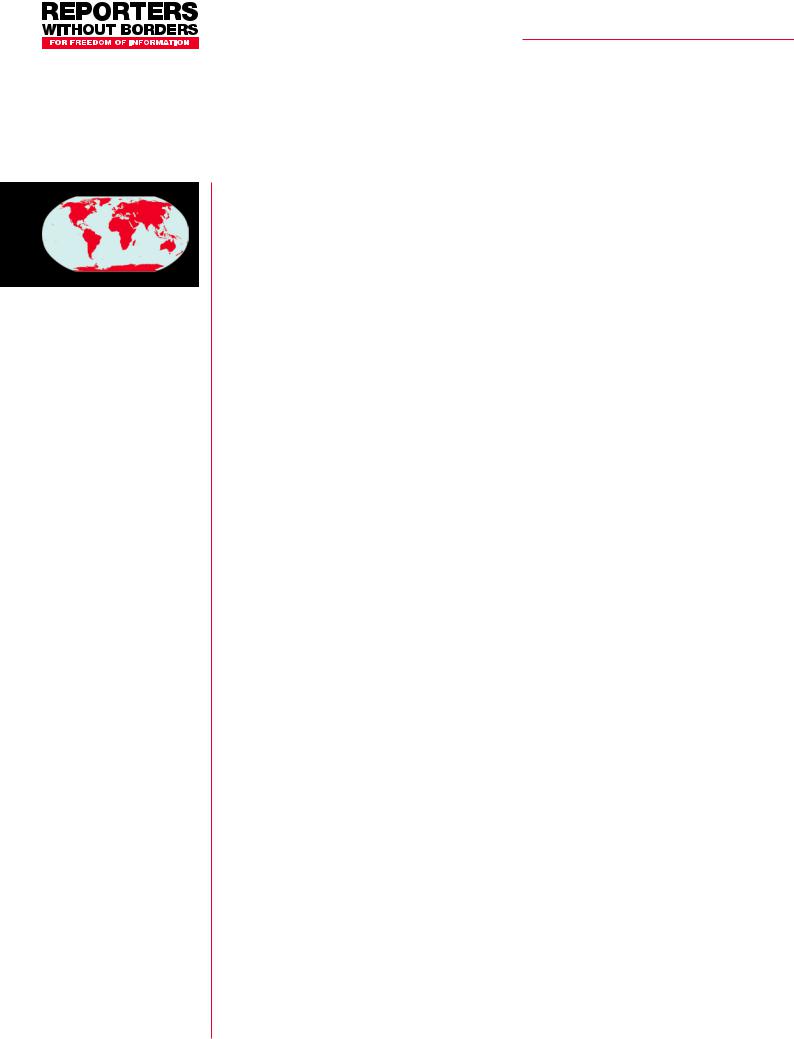
2013 World Press Freedom Index
2013 Press Freedom Index
Reporters Without Borders promotes and defends the freedom to be informed and to inform others throughout the world. Based in Paris, it has ten international offices
(Berlin, Brussels, Geneva, Madrid, Montreal, New York,
Stockholm, Tunis, Vienna and
Washington DC) and more than
150 correspondents in all five continents.
47, rue Vivienne
75002 Paris,
Tel. : 33 1 44 83 84 56 Fax : 33 1 45 23 11 51 presse@rsf.org
Read more : www.rsf.org
dashed hopes follow spring
Reporters Without Borders launches media
freedom “indicator”
After the “Arab springs” and other protest movements that prompted many rises and falls in last year’s index, the 2013 Reporters Without Borders World Press Freedom Index marks a return to a more usual configuration.
The ranking of most countries is no longer attributable to dramatic political developments. This year’s index is a better reflection of the attitudes and intentions of governments towards media freedom in the medium or long term.
The same three European countries that headed the index last year hold the top three positions again this year. For the third year running, Finland has distinguished itself as the country that
most respects media freedom. It is followed by the Netherlands and Norway.
Although many criteria are considered, ranging from legislation to violence against journalists, democratic countries occupy the top of the index while dictatorial countries occupy the
last three positions. Again it is the same three as last year – Turkmenistan, North Korea and Eritrea.
“The Press Freedom Index published by Reporters Without Borders does not take direct account of the kind of political system but it is clear that democracies provide better protection for the freedom to produce and circulate accurate news and information than countries where human rights are flouted,” Reporters
Without Borders secretary-general Christophe
Deloire said.
“In dictatorships, news providers and their families are exposed to ruthless reprisals, while in democracies news providers have to cope with the media’s economic crises and conflicts of interest. While their situation is not always comparable, we should pay tribute to all those who resist pressure whether it is aggressively focused or diffuse.”
Coinciding with the release of its 2013 Press Freedom Index, Reporters Without Borders is for the first time publishing an annual global “indicator” of worldwide media freedom.
This new analytic tool measures the overall level of freedom of information in the world and the performance of the world’s governments in their entirety as regards this key freedom.
In view of the emergence of new technologies and the interdependence of governments and peoples, the freedom to produce and circulate news and information needs to be evaluated at the planetary as well as national level. Today, in 2013, the media freedom “indicator” stands at 3395, a point of reference for the years to come1.
The indicator can also be broken down by region and, by means of weighting based on the population of each region, can be used to produce a score from zero to 100 in which zero represents total respect for media freedom.
This produces a score of 17.5 for Europe2, 30.0 for the Americas, 34.3 for Africa, 42.2 for AsiaPacific and 45.3 for the former Soviet republics.
Despite the Arab springs, the Middle East and
North Africa region comes last with 48.5.
The high number of journalists and netizens killed in the course of their work in 2012 (the
1.The method of compiling the press freedom index has changed slightly and the range of criteria has been expanded in order to better evaluate all the factors that determine the level of freedom of information in a country. The indicator is the sum of the scores of all the countries in the press freedom index. Like individual country scores, the higher the figure, the worse the situation. The lower the figure, the better (see “How we compiled the 2013 Press Freedom Index”).
2.The region consists of the European Union, Norway, Switzerland and the Balkans.
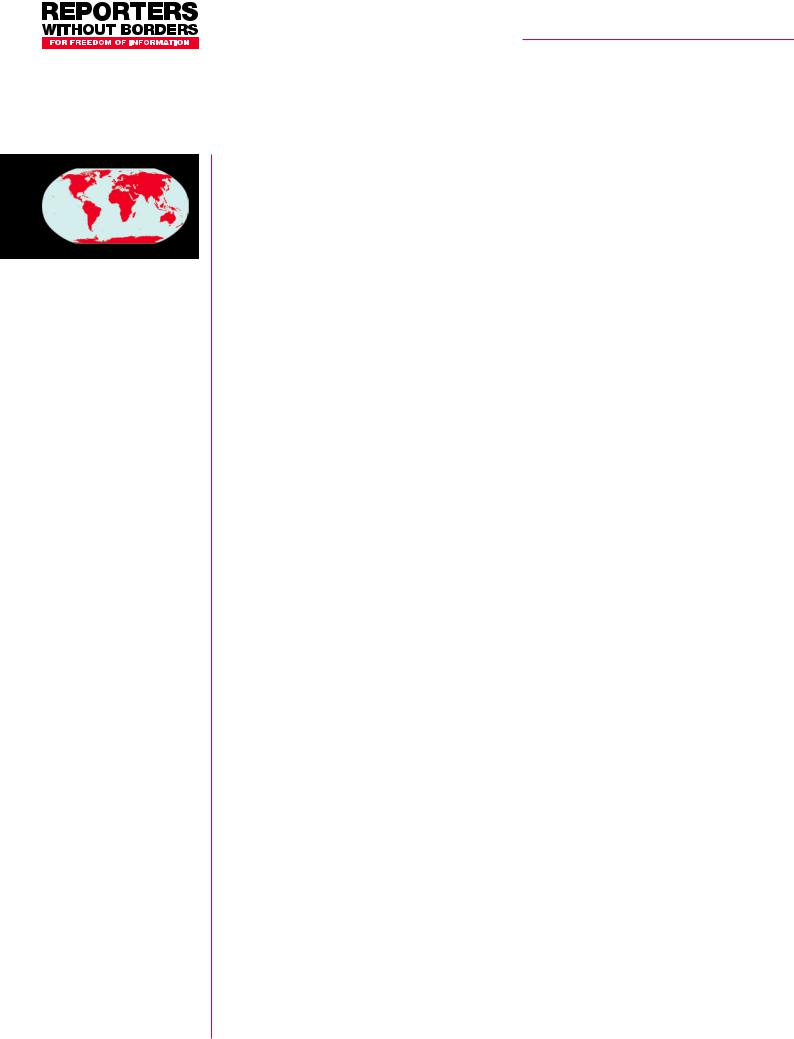
2013 World Press Freedom Index
Reporters Without Borders promotes and defends the freedom to be informed and to inform others throughout the world. Based in Paris, it has ten international offices
(Berlin, Brussels, Geneva, Madrid, Montreal, New York,
Stockholm, Tunis, Vienna and
Washington DC) and more than
150 correspondents in all five continents.
47, rue Vivienne
75002 Paris,
Tel. : 33 1 44 83 84 56 Fax : 33 1 45 23 11 51 presse@rsf.org
Read more : www.rsf.org
deadliest year ever registered by Reporters Without Borders in its annual roundup), naturally had an a significant impact on the ranking of
the countries where these murders took place, above all Somalia (175th, -11), Syria (176th, 0), Mexico (153rd, -4) and Pakistan (159th, -8).
From top to bottom
The Nordic countries have again demonstrated
their ability to maintain an optimal environment for news providers. Finland (1st, 0), Netherlands (2nd, +1) and Norway (3rd, -2) have held on to the first three places. Canada (20th, -10)
only just avoided dropping out of the top 20.
Andorra (5th) and Liechtenstein (7th) have entered the index for the first time just behind the three leaders.
At the other end of the index, the same three countries as ever – Turkmenistan, North Korea and Eritrea – occupy the last three
places in the index. Kim Jong-un’s arrival at the head of the Hermit Kingdom has not in any way
changed the regime’s absolute control of news and information. Eritrea (179th, 0), which was
recently shaken by a brief mutiny by soldiers at the information ministry, continues to be a vast open prison for its people and lets journalists die in detention. Despite its reformist discourse, the Turkmen regime has not yielded an inch of its totalitarian control of the media.
For the second year running, the bottom three countries are immediately preceded by Syria
(176th, 0), where a deadly information war is being waged, and Somalia (175th, -11), which
has had a deadly year for journalists. Iran (174th, +1), China (173rd, +1), Vietnam (unchanged at 172nd), Cuba (171st, -4), Sudan (170th, 0) and Yemen (169th, +2) complete the list of the ten
countries that respect media freedom least.
Not content with imprisoning journalists and netizens, Iran also harasses the relatives of journalists, including the relatives of those who are abroad.
Big rises...
Malawi (75th, +71) registered the biggest leap in the index, almost returning to the position it held
before the excesses at the end of the Mutharika administration. Côte d’Ivoire (96th, +63),
which is emerging from the post-electoral crisis between the supporters of Laurent Gbagbo and
Alassane Ouattara, has also soared, attaining its best position since 2003.
Burma (151st, +18) continued the ascent begun in last year’s index. Previously, it had been in the bottom 15 every year since 2002 but now, thanks to the Burmese spring’s unprecedented
reforms, it has reached its best-ever position.
Afghanistan (128th, +22) also registered a significant rise thanks to the fact that no journalists are in prison. It is nonetheless facing many challenges, especially with the withdrawal of foreign troops.
...and big falls
Mali (99th, -74) registered the biggest fall in the index as a result of all the turmoil in 2012. The military coup in Bamako on 22 March and the north’s takeover by armed Islamists and Tua-
reg separatists exposed the media in the north to censorship and violence. Tanzania (70th,
-36) sank more than 30 places because, in the space of four months, a journalist was killed while covering a demonstration and another was murdered.
Buffeted by social and economic protests, the Sultanate of Oman (141st) sank 24 places, the
biggest fall in the Middle East and North Africa in 2012. Some 50 netizens and bloggers were prosecuted on lèse majesté or cyber-crime charges in 2012. No fewer than 28 were convicted in December alone, in trials that trampled on defence rights.
Journalists in Israel (112th, -20) enjoy real freedom of expression despite the existence of military censorship but the country fell in the index because of the Israeli military’s targeting of journalists in the Palestinian Territories.
In Asia, Japan (53rd, -31) has been affected by a lack of transparency and almost zero respect for access to information on subjects directly or
indirectly related to Fukushima. This sharp fall should sound an alarm. Malaysia (145th, -23)
has fallen to its lowest-ever position because access to information is becoming more and
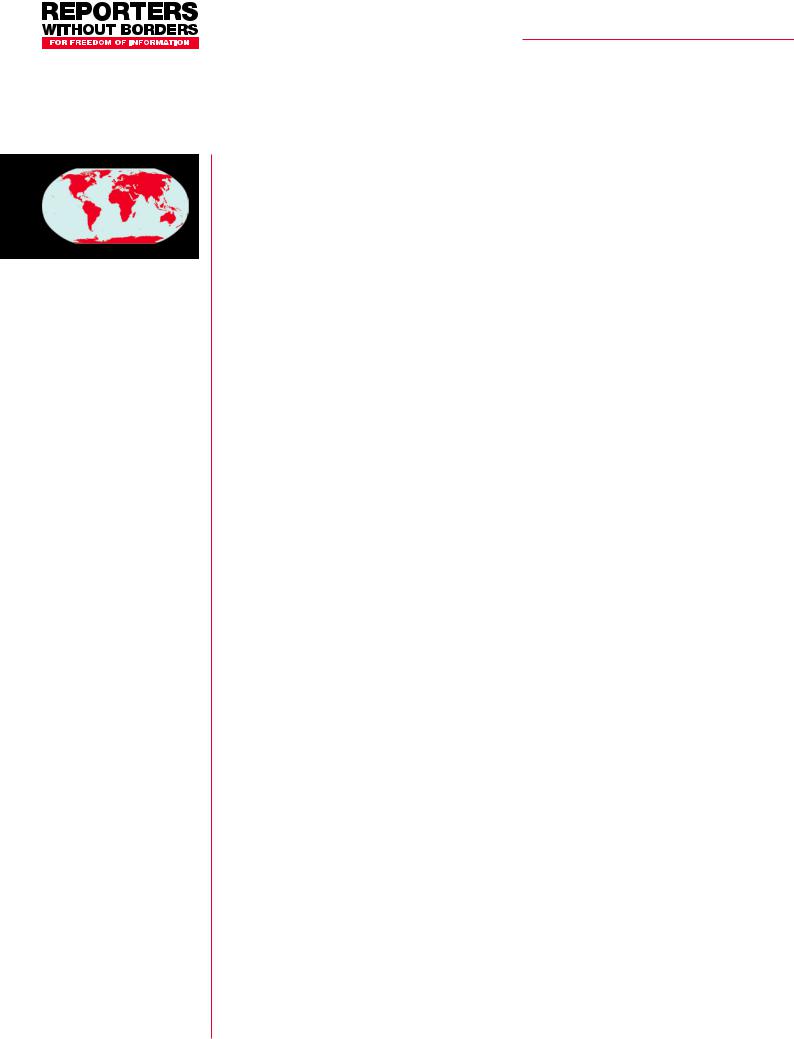
2013 World Press Freedom Index
Reporters Without Borders promotes and defends the freedom to be informed and to inform others throughout the world. Based in Paris, it has ten international offices
(Berlin, Brussels, Geneva, Madrid, Montreal, New York,
Stockholm, Tunis, Vienna and
Washington DC) and more than
150 correspondents in all five continents.
47, rue Vivienne
75002 Paris,
Tel. : 33 1 44 83 84 56 Fax : 33 1 45 23 11 51 presse@rsf.org
Read more : www.rsf.org
more limited. The same situation prevails in
Cambodia (143rd, -26), where authoritarianism and censorship are on the increase. Macedo-
nia (116th, -22) has also fallen more than 20 places following the arbitrary withdrawal of media licences and deterioration in the environment for journalists.
Varied impact of major protest movements
Last year’s index was marked by the Arab spring’s major news developments and the heavy price paid by those covering the protest movements. A range of scenarios has been
seen in 2012, including countries such as Tunisia, Egypt and Libya, where regime change has taken place, countries such as Syria and Bahrain where uprisings and the resulting
repression are still ongoing, and countries such as Morocco, Algeria, Oman, Jordan and
Saudi Arabia, where the authorities have used promises and compromise to defuse calls for political and/or social and economic change.
Some of the new governments spawned by these protest movements have turned on the journalists and netizens who covered these movements’ demands and aspirations for more freedom. What with legal voids, arbitrary appointments of state media chiefs, physical
attacks, trials and a lack of transparency, Tunisia (138th, -4) and Egypt (158th, +8) have remai-
ned at a deplorable level in the index and have highlighted the stumbling blocks that Libya (131st, +23) should avoid in order to maintain its transition to a free press.
The deadliest country for journalists in 2012 was Syria (176th, 0), where journalists and netizens are the victims of an information war waged by both the Assad regime, which stops at nothing in order to crack down and impose a news blackout, and by opposition factions that are increasingly intolerant of dissent. In Bahrain
(165th, +8) the repression let up slightly, while in Yemen (169th, +2) the prospects continue
to be disturbing despite a change of government. Oman (141st, -24) fell sharply because of a wave of arrests of netizens.
Other countries hit by protests saw changes for the better and worse. Vietnam (172nd, 0) failed
to recover the six places it lost in the previous index. The world’s second biggest prison for
netizens, it has remained in the bottom ten.
Uganda (104th, +35) has recovered a more appropriate position although it has not gone back to where it was before cracking down on protests in 2011.
Azerbaijan (156th, +6) and Belarus (157th, +11) both fell last year after using violence to suppress opposition demonstrations and this
year they just moved back towards their appalling former positions. Chile (60th, +20) is begin-
ning to recover after plummeting 33 places to 80th in last year’s index.
Political instability puts journalists in the eye of the storm
Political instability often has a divisive effect on the media and makes it very difficult to produce independently-reported news and information.
In such situations, threats and physical attacks
on journalists and staff purges are common.
Maldives (103rd, -30) fell sharply after the president’s removal in an alleged coup, followed by
threats and attacks on journalists regarded as his supporters. In Paraguay (91st, -11), the pre-
sident’s removal in a parliamentary “coup” on
22 June 2012 had a big impact on state-owned broadcasting, with a wave of arbitrary dismissals against a backdrop of unfair frequency allocation.
Guinea-Bissau (92nd, -17) fell sharply because the army overthrew the government between the first and second rounds of a presidential election and imposed military censorship on the media. In Mali (99th, -74), a military coup fuelled tension, many journalists were physically attacked in the capital and the army now controls the
state-owned media. This index does not reflect the January 2013 turmoil in the Central African Republic (65th, -3) but its impact on media free-
dom is already a source of extreme concern.
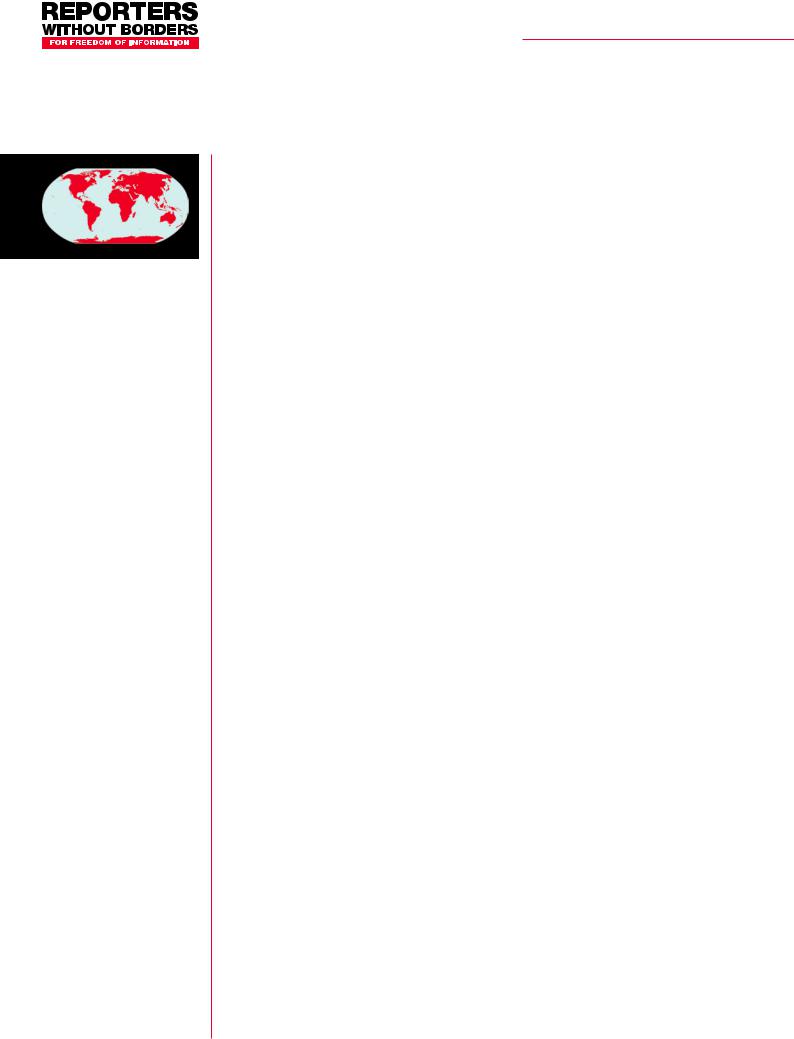
“Regional models” found wanting
In almost all parts of the world, influen-
tial countries that are regarded as “regional models” have fallen in the index. Brazil (108th,
-9), South America’s economic engine, continued last year’s fall because five journalists were killed in 2012 and because of persistent problems affecting media pluralism.
In Asia, India (140th, -9) is at its lowest since 2002 because of increasing impunity for violence against journalists and because Internet censorship continues to grow. China (173rd, +1) shows no sign of improving. Its prisons still hold many journalists and netizens, while increasingly unpopular Internet censorship continues to be a major obstacle to access to information.
In Eastern Europe, Russia (148th, -6) has fallen again because, since Vladimir Putin’s return to the presidency, repression has been stepped up in response to an unprecedented wave of opposition protests. The country also continues to be marked by the unacceptable failure to punish all those who have murdered or attacked journalists. The political importance of Turkey
(154th, -6) has grown even more because of the armed conflict in neighbouring Syria but it has again fallen in the index. It is currently the world’s biggest prison for journalists, especially those who express views critical of the authorities on the Kurdish issue.
There is no comparison with South Africa (52nd,
-10), where freedom of information is a reality. It still has a respectable ranking but it has been slipping steadily in the index and, for the first
Reporters Without Borders promotes and defends the freedom to be informed and to inform others throughout the world. Based in Paris, it has ten international offices
(Berlin, Brussels, Geneva, Madrid, Montreal, New York,
Stockholm, Tunis, Vienna and
Washington DC) and more than
150 correspondents in all five continents.
47, rue Vivienne
75002 Paris,
Tel. : 33 1 44 83 84 56 Fax : 33 1 45 23 11 51 presse@rsf.org
Read more : www.rsf.org
2013 World Press Freedom Index
time, is no longer in the top 50. Investigative journalism is threatened by the Protection of
State Information Bill.
Democracies that stall or go into reverse
The situation is unchanged for much of the
European Union. Sixteen of its members are still in the top 30. But the European model is unravelling. The bad legislation seen in 2011 continued, especially in Italy (57th, +4), where defamation has yet to be decriminalized and
state agencies make dangerous use of gag laws. Hungary (56th, -16) is still paying the price
of its repressive legislative reforms, which had
a major impact on the way journalists work. But
Greece’s dramatic fall (84th, -14) is even more disturbing. The social and professional environment for its journalists, who are exposed to public condemnation and violence from both extremist groups and the police, is disastrous.
Japan (53rd, -31) plummeted because of censorship of nuclear industry coverage and its failure to reform the “kisha club” system. This
is an alarming fall for a country that usually has a good ranking. Argentina (54th, -7) fell amid
growing tension between the government and certain privately-owned media about a new law regulating the broadcast media.
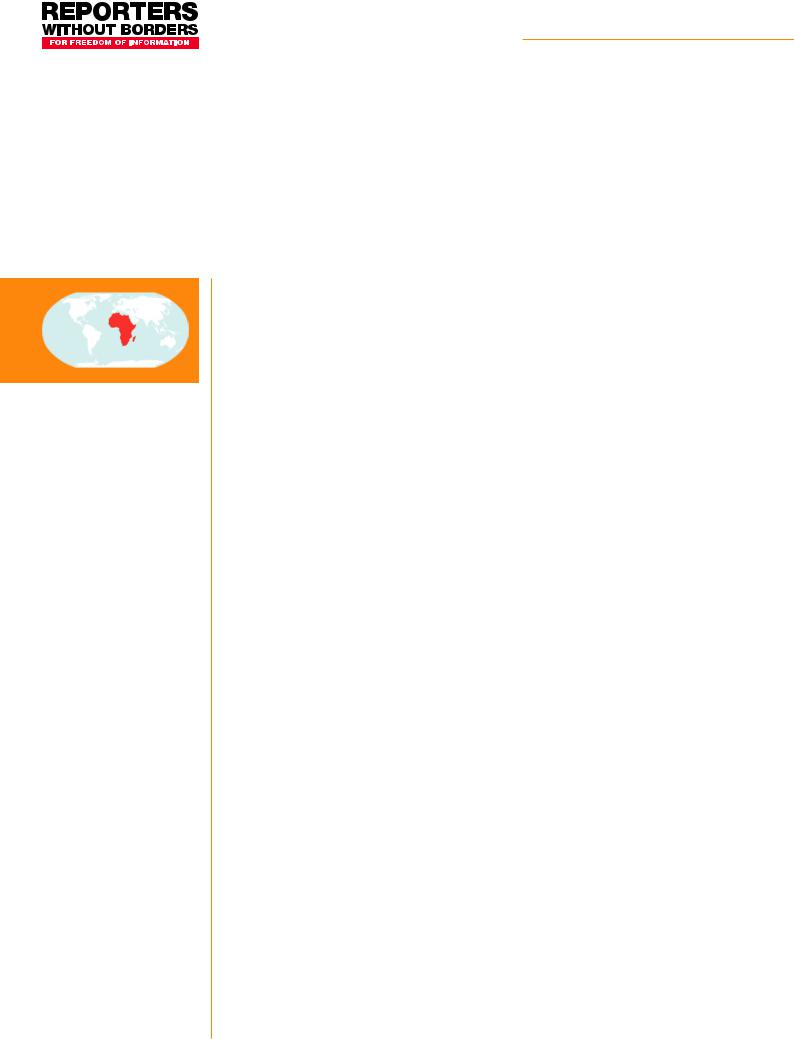
2013 World Press Freedom Index
africa
Reporters Without Borders promotes and defends the freedom to be informed and to inform others throughout the world. Based in Paris, it has ten international offices
(Berlin, Brussels, Geneva, Madrid, Montreal, New York,
Stockholm, Tunis, Vienna and
Washington DC) and more than
150 correspondents in all five continents.
47, rue Vivienne
75002 Paris,
Tel. : 33 1 44 83 84 56 Fax : 33 1 45 23 11 51 presse@rsf.org
Read more : www.rsf.org
East Africa stagnates near bottom of the index,
Mali nosedives
East Africa: journalists’ graveyard
In Somalia (175th, -11) 18 journalists were killed, caught up in bomb attacks or the direct targets of murder, making 2012 the deadliest in history for the country’s media. The Horn of
Africa state was the second most dangerous
country in the world for those working in news and information, behind Syria. In Eritrea (in last
place in the index for the sixth successive year), no journalists were killed but some were left to die, which amounts to the same thing. With at least 30 behind bars, it is Africa’s biggest prison for journalists. Of 11 incarcerated since 2001,
7 have died as a result of prison conditions or have killed themselves. Since the independent media were abolished more than 10 years ago, there are no independent Eritrean news outlets, other than outside the country, and terror prevails.
East Africa is also a region of censorship and crackdowns. Omar al-Bashir’s Sudan, where more newspapers were seized and the arrests of journalists continued during the summer, is
stuck firmly in 170th place, in the bottom 10 of the index. Djibouti (167th, -8), which also has no
independent media, detained a correspondent of the foreign-based news site La Voix de Dji-
bouti. Despite the release of two Swedish journalists arrested in 2011, Ethiopia (137th) fell ten
places because of its repressive application of the 2009 anti-terrorist law and the continued detention of several local journalists.
Political unrest in Mali and the Central African Republic
Mali (99th, -74), which was long presented as the continent’s star performer in democracy and press freedom, was prey to the political events that overtook it during the year. The military coup in Bamako on 22 March and the seizure of the north of the country by Touareg separatists and Islamic fundamentalists exposed news organizations to censorship and abuses. Many northern radio stations stopped broadcasting, while in the capital several Malian and foreign journalists were assaulted. All these occurred before the external military intervention in
January 2013.
The Central African Republic was ranked 65th in 2012. Events after the outbreak of the Seleka rebellion at the very end of the year (radio stations ransacked, one journalist killed) were not taken into consideration in this index, thus preventing the country from falling more than
50 places. These will be included in the 2014 version. In Guinea-Bissau (92nd, -17) a media
blackout and military censorship that followed the coup on 12 April explain that country’s drop.
Africa’s predatory censors
Yahya Jammeh, King Mswati III, Paul Kagame, and Teodoro Obiang Nguema, together
with other heads of state such as Issaias Afeworki (Eritrea) and Ismael Omar Guelleh
(Djibouti) are members of an exclusive club of authoritarian African leaders, some eccentric others stern, who hold their countries in an
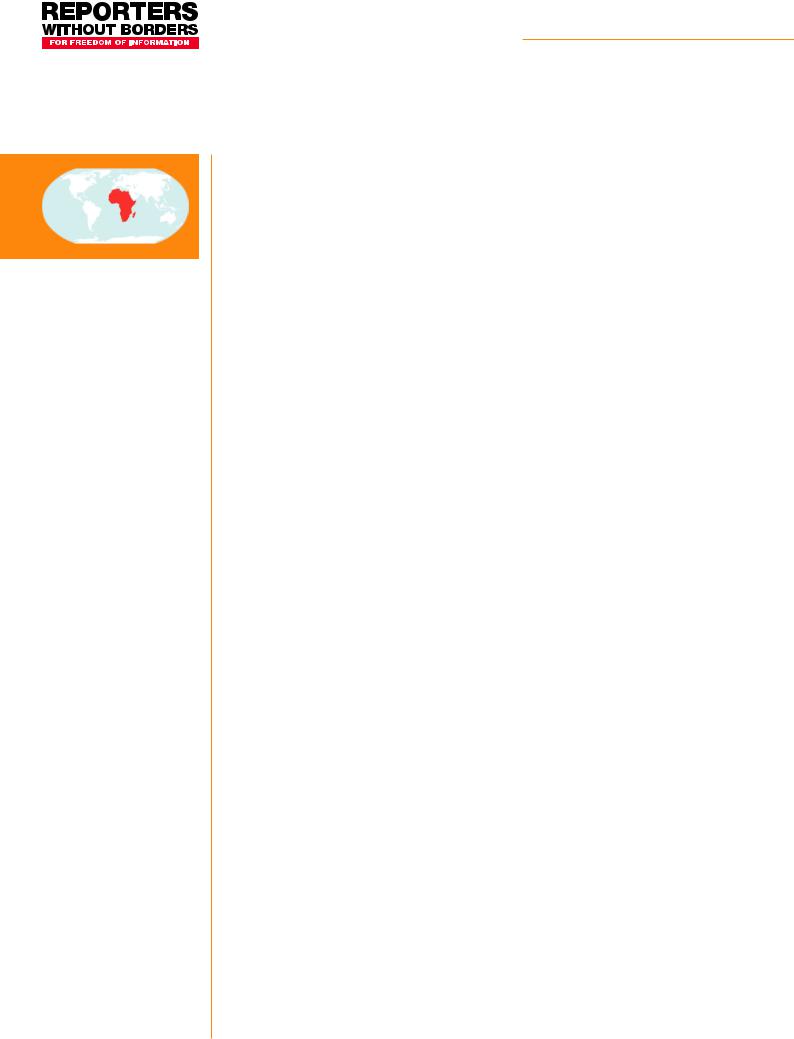
Africa
Reporters Without Borders promotes and defends the freedom to be informed and to inform others throughout the world. Based in Paris, it has ten international offices
(Berlin, Brussels, Geneva, Madrid, Montreal, New York,
Stockholm, Tunis, Vienna and
Washington DC) and more than
150 correspondents in all five continents.
47, rue Vivienne
75002 Paris,
Tel. : 33 1 44 83 84 56 Fax : 33 1 45 23 11 51 presse@rsf.org
Read more : www.rsf.org
2013 World Press Freedom Index
iron grasp and keep a firm grip on news and
information. Their countries, respectively
Gambia (152nd), Swaziland (155th), Rwanda
(161st) and Equatorial Guinea (166th), are all among the bottom 30 in the index. Media pluralism has been whittled away and criticism of the head of state discouraged.
The biggest losses
Chad, which fell 18 places to 121st, saw journalists harassed and roughed up, the publication of the newspaper N’Djamena Bi-Hebdo temporarily halted and its publisher sentenced to a suspended prison term, and a highly repressive bill kept under wraps. The slow but sure pro-
gress that followed the formation of a national unity government in Zimbabwe (133rd, -16) in
2009 and the granting of publication licences to several independent newspapers appeared to have stalled. Violence and arrests of journalists still niggle and if elections go ahead as planned in 2013, the atmosphere for the media
promises to be tense. Relatively high placed in
2011-2012, South Sudan (124th) fell 12 places after the murder of a columnist – the first killing of its kind in the new country – as news organizations and journalists awaited the approval of three new laws on the media.
Despite the holding of a national media conference in Cameroon (120th, -23), the future of the
sector remains both uncertain and worrying. In the upper reaches of the index, Niger (43rd)
nonetheless fell 14 places as a result of the irresponsibility of a few journalists who succumbed to the temptation to abuse the freedom that
they enjoyed. Within the space of four months in Tanzania (70th, -36), one journalist was kil-
led while he was covering a demonstration
and another was found dead, a clear victim of murder. Burundi (132nd) fell only two places but
remains a low position. Summonses of journalists declined but the case of Hassan Ruvakuki, given a life sentence reduced to three years on appeal, has created an atmosphere of fear among the media.
Bingu Wa Mutharika, a violent crackdown on
demonstrations and the murder of the blogger Robert Chasowa, Malawi (75th) recorded the
biggest jump in the entire index, up 71 places,
close to the position it held in 2010. Similarly,
Côte d’Ivoire rose 63 places to 96th despite persistent problems. It had plummeted in the previous index because of a post-election crisis and the murders of a journalist and another
media worker, as well as the civil conflict that broke out in Abidjan in April. Uganda (104th)
was up 35 places thanks to a better year, but things were far from satisfactory as far as the media were concerned. The year ended with
President Yoweri Museveni making open threats to several radio stations.
Promising gains
For Senegal (59th, +16), 2012 was a year of hope. The presidential election took place in a peaceful atmosphere for the media, despite a few regrettable assaults on journalists, and
President Macky Sall, who had declared himself willing to decriminalize press offences, took office. Much remains to be proved in 2013, as was illustrated by the prison sentence handed down on a journalist in December.
In Liberia (97th, +13), the presidential election in November 2011 had been tainted by the closure of several media outlets and attacks on journalists. In 2012, the atmosphere improved greatly. In the summer, President Ellen Johnson Sirleaf became the second African head of state, after Mahamadou Issoufou of Niger, to sign the Declaration of Table Mountain, thereby
undertaking to promote media freedom. Namibia (19th), Cape Verde (25th) and Ghana (30th)
maintained their record as the highest ranked
African countries.
Return to normality
After a dreadful year in 2011, marked by the dictatorial behaviour of the late President
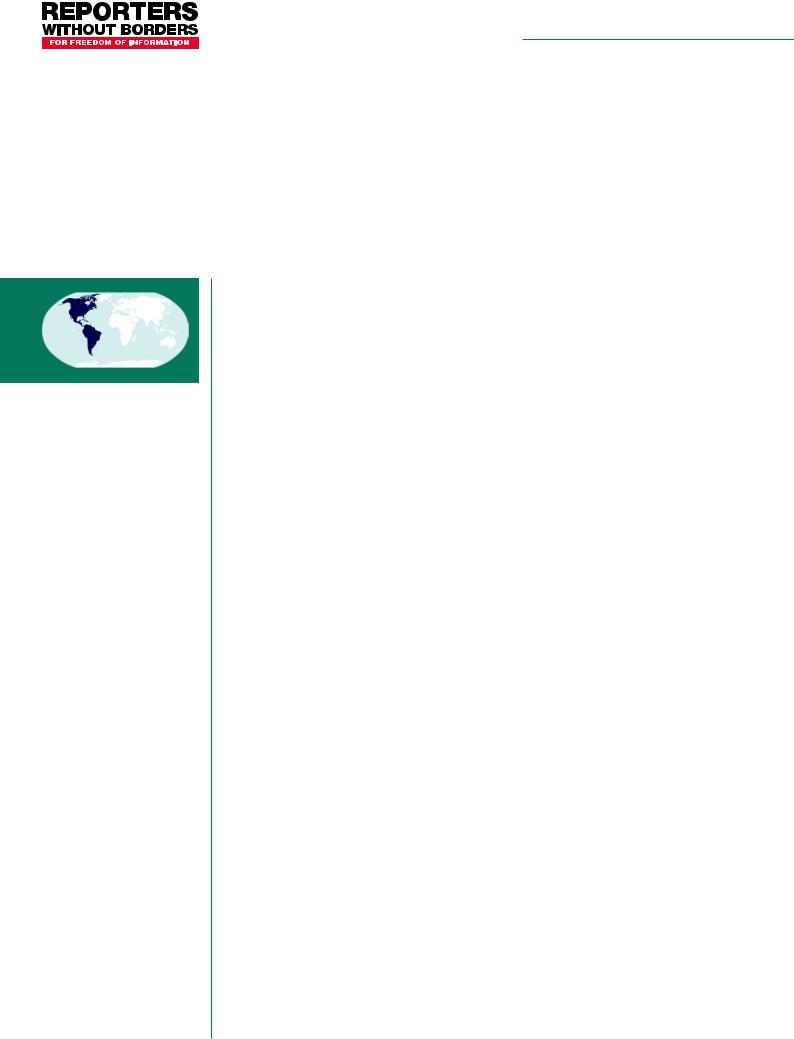
2013 World Press Freedom Index
THE Americas
Reporters Without Borders promotes and defends the freedom to be informed and to inform others throughout the world. Based in Paris, it has ten international offices
(Berlin, Brussels, Geneva, Madrid, Montreal, New York,
Stockholm, Tunis, Vienna and
Washington DC) and more than
150 correspondents in all five continents.
47, rue Vivienne
75002 Paris,
Tel. : 33 1 44 83 84 56 Fax : 33 1 45 23 11 51 presse@rsf.org
Read more : www.rsf.org
Violence, polarization still obstruct reporting in Americas
Deceptive progress, ups and downs in south
Just as the emergence of major protest movements (and ensuing crackdowns) had a big impact on the rankings of certain countries in 2011, so a decline in the protests has logically also had an impact a year later.
Chile, for example, rose 20 places to 60th in the index after the previous year’s student protests abated in 2012. Crackdowns were concentrated in the Aysén region, which saw big protests in the first quarter. But Chile’s improvement must be put in perspective. Its media landscape is skewed, community broadcast media are criminalized, especially in the Mapuche region, and journalists have run into difficulties when trying to investigate the 1973-90 military dictatorship.
For similar reasons, the United States rose 15 places to 32nd, recovering a ranking more appropriate to the “country of the First Amendment.” Its previous year’s fall was due to the fact that the crackdown on the Occupy Wall Street
movement did not spare reporters in the field.
Canada, on the other hand, fell 10 positions
to 20th, losing its status as the western hemisphere’s leader to Jamaica (13th). This was due
to obstruction of journalists during the so-called
“Maple Spring” student movement and to continuing threats to the confidentiality of journalists’ sources and Internet users’ personal data, in particular, from the C-30 bill on cyber-crime.
The clearest new trends are to be seen in the south. Brazil fell again, this time 9 places to
108th, after falling 41 places in 2011. Its media landscape is also badly distorted. Heavily dependent on the political authorities at the state level, the regional media are exposed to attacks, physical violence against their person-
nel, and court censorship orders, which also target the blogosphere. These problems were exacerbated by violence during the campaign for the October 2012 municipal elections.
Media wars and coup precipitate falls
Paraguay fell 11 places to 91st following President Fernando Lugo’s June 2012 removal in an “institutional coup d’état,” which had an almost immediate impact on the news media.
A full-blown purge of employees in state-owned media created by the Lugo administration was accompanied by frequent programme censorship. The few community radio stations with broadcast frequencies were also scared of losing them.
Despite a high level of physical violence against
journalists, Peru rose 10 places to 105th, now topping Brazil, itself one place above Bolivia
(109th), where several media were the targets of spectacular arson or dynamite attacks and
both national and local polarization are having an impact. Ecuador fell 15th places to 119th after
a year of extreme tension between the govern-
ment and leading privately-owned media. This left it two places below Venezuela, where seve-
ral media were closed arbitrarily, a journalist was killed and more than 170 cases of violence were reported in a “media war” climate.
Although on a less dramatic scale, polarization is becoming a concern in Argentina, which
slipped a few places to 54th amid growing tension between the government and certain pri- vately-owned media, above all the Clarín group, which is resisting full implementation of the 2009
Ley de Medios, a law regulating the broadcast
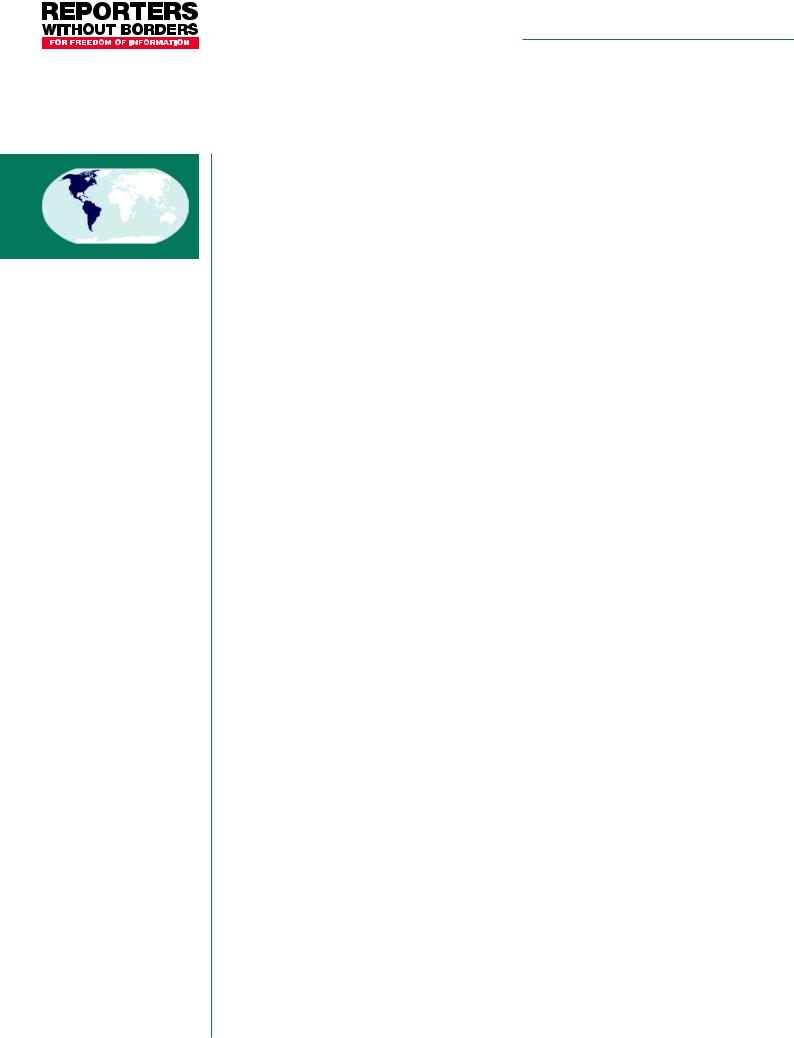
The Americas
Reporters Without Borders promotes and defends the freedom to be informed and to inform others throughout the world. Based in Paris, it has ten international offices
(Berlin, Brussels, Geneva, Madrid, Montreal, New York,
Stockholm, Tunis, Vienna and
Washington DC) and more than
150 correspondents in all five continents.
47, rue Vivienne
75002 Paris,
Tel. : 33 1 44 83 84 56 Fax : 33 1 45 23 11 51 presse@rsf.org
Read more : www.rsf.org
2013 World Press Freedom Index
media. On the other bank of the River Plate,
Uruguay continued its climb, this time to 27th position, within 10 places of Costa Rica, still
Latin America’s leader at 18th.
There has been little change in the marked contrasts that were seen in Central America in
2011. A lack of pluralism, intermittent tension with the political authorities, harassment and
self-censorship are the main reasons for the scant change in Nicaragua (78th), Guatemala (95th) and Panama (111th), where attacks on
journalists tripled in the space of a year, local unions said.
On the other hand, El Salvador owes its enviable 38th place to government efforts to combat violence crime, even if journalists and
media often complain about the lack of access to state-held information. The Dominican Republic rose 15 places to 80th because of a
decline in violence against journalists and legal proceedings that threaten freedom of information. But it is still far behind its neighbour Haiti
(49th), where the situation is still largely unchanged although some journalists have accused President Michel Martelly of hostility towards them.
Caribbean turmoil, same countries at the bottom
Political tension and judicial harassment
account for the ranking of other countries in the
Guyanas and Caribbean. Trinidad and Tobago
(44th) still has not stopped its illegal monitoring of journalists’ phone calls and attempts to iden-
tify their sources, although it promised to stop in 2010. In Surinam (down nine places to 31th),
the often stormy relations between President Desi Bouterse and many journalists are unlikely to improve after the passage of an amnesty law for the murders of around 15 government opponents, including five journalists, three decades
ago when Bouterse was Surinam’s dictator. He returned to power through the polls in 2010.
The seven-member Organization of East Caribbean States fell eight places to 34th
because of often direct pressure from the political authorities on news media and the failure to move ahead with the decriminalization of defamation. Similar pressure was reported in Guyana (69th), whose ranking continues to suffer from the state’s monopoly of radio broadcasting.
In the bottom third, Honduras was 127th because two journalists were killed in direct connection with their work and because the status quo imposed by the June 2009 coup remains unchanged. There has never been any let-up in the persecution of opposition media and community radio stations, or in the criminalization of human rights activists and grassroots movements that provide information about such sensitive issues as land disputes, police abuses and minority rights.
Although hopes have been raised by the latest
negotiations between the government and FARC guerrillas, Colombia (129th) still has its
paramilitaries-turned-drug traffickers, who are the enemies of all those involved in the provision of news and information. Another journalist was killed in 2012 although there was a slight decrease in the number of physical attacks.
With six journalists killed, Mexico (153rd) has maintained its status as the hemisphere’s most dangerous country for the media. Violence and censorship were particularly noticeable during the controversial July 2012 elections, which restored the presidency to the Institutional
Revolutionary Party (PRI). Cuba, the hemisphere’s only country to tolerate no independent media (or with few exceptions), got the region’s lowest ranking – 171st. The past year has seen a renewed crackdown on dissent and the island now has two journalists in prison, one of them a state media employee.
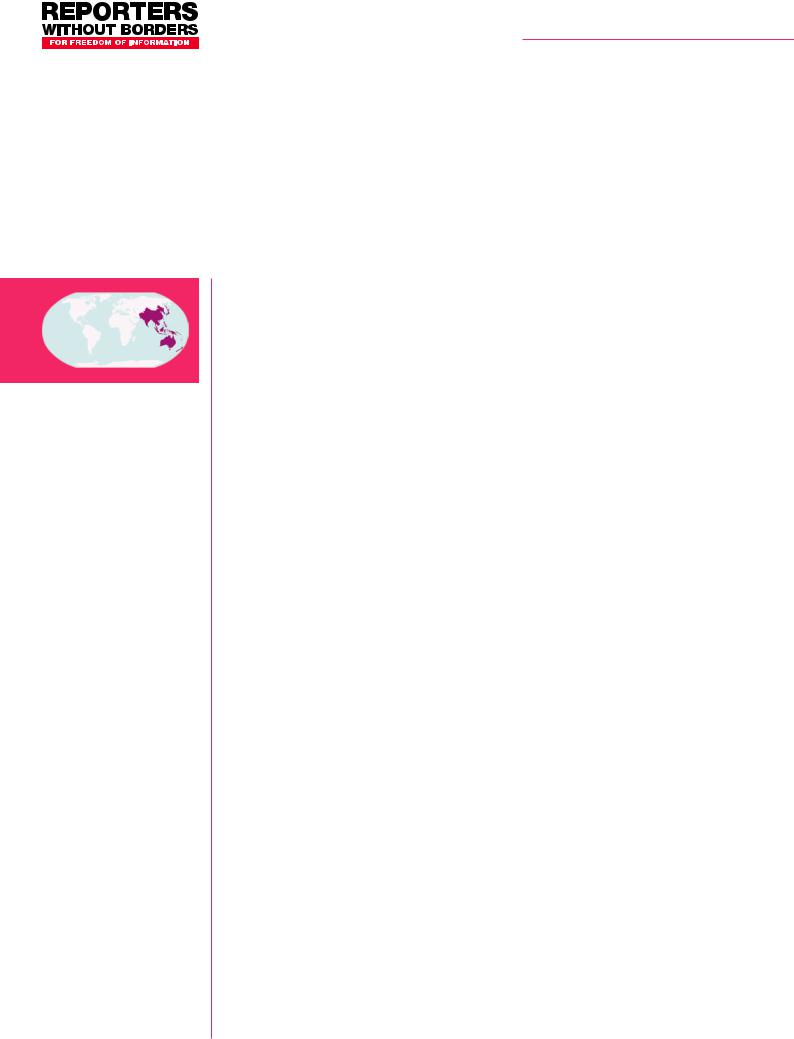
2013 World Press Freedom Index
Asia-Pacific area
Reporters Without Borders promotes and defends the freedom to be informed and to inform others throughout the world. Based in Paris, it has ten international offices
(Berlin, Brussels, Geneva, Madrid, Montreal, New York,
Stockholm, Tunis, Vienna and
Washington DC) and more than
150 correspondents in all five continents.
47, rue Vivienne
75002 Paris,
Tel. : 33 1 44 83 84 56 Fax : 33 1 45 23 11 51 presse@rsf.org
Read more : www.rsf.org
Burmese spring an exception to decline in freedom of information in Asia
Only three Asian countries are in the top 25 percent of the table, while 15 countries are among the bottom 45 places. Unsurprisingly, one-party authoritarian governments figure more than ever among the predators of press freedom and languish at the bottom end of the table.
Burma’s paper revolution
Burma went through dramatic changes in 2012 and moved up to 151th place, a rise of 18 places, jumping ahead of its usual bedfellows in the media repression stakes. There are no longer any journalists or cyber dissidents in the jails of the old military dictatorship. Legislative reform has only just begun but the steps already taken by the government in favour of the media, such as an end to prior censorship and the permitted return of media organizations from exile, are significant steps towards genuine freedom of information.
China, Vietnam, Laos, North Korea: no signs of improvement
North Korea (178th), China (173rd), Vietnam
(172nd) and Laos (168th), all ruled by authoritarian parties, still refuse to grant their citizens the freedom to be informed. The control of news and information is a key issue for these govern-
ment, which are horrified at the prospect of being open to criticism. North Korea’s leader
Kim Jong-un, who succeeded his father Kim Jong-il on 30 December 2011, appears to rule in concert with the military junta.
In Vietnam and China, those involved in online news and information, such as bloggers and netizens, are forced to deal with increasingly harsh repression. Many Tibetan monks have been convicted or abducted for having sent information abroad about the disastrous state of human rights in Tibet. Commercial news outlets and foreign media organizations are still censored regularly by the propaganda department. Faced with the growing power of social networks and their ability to muster support, the authorities have redoubled their efforts to hone their capability to track “sensitive” content and delete it immediately from the Web. In less than a year, Vietnamese courts have sentenced 12 bloggers and cyber-dissidents to jail terms of up to 13 years, making the country the world’s
second biggest prison for netizens, after
China.
General decline in freedom of information in South Asia
The Indian subcontinent was the Asian region that saw the sharpest deterioration in the cli-
mate for those involved in news and information in 2012. In the Maldives, which crashed
to 103rd place (-30), the events that led to the resignation of President Mohammed Nasheed in February led to violence and threats against journalists in state television and private media outlets regarded as pro-Nasheed by the coup leaders.
Attacks on press freedom have increased since then. Many journalists have been arrested, assaulted and threatened during anti-govern- ment protests. On June 5, the freelance journalist and blogger Ismail “Hilath” Rasheed narrowly survived the first attempted murder of
